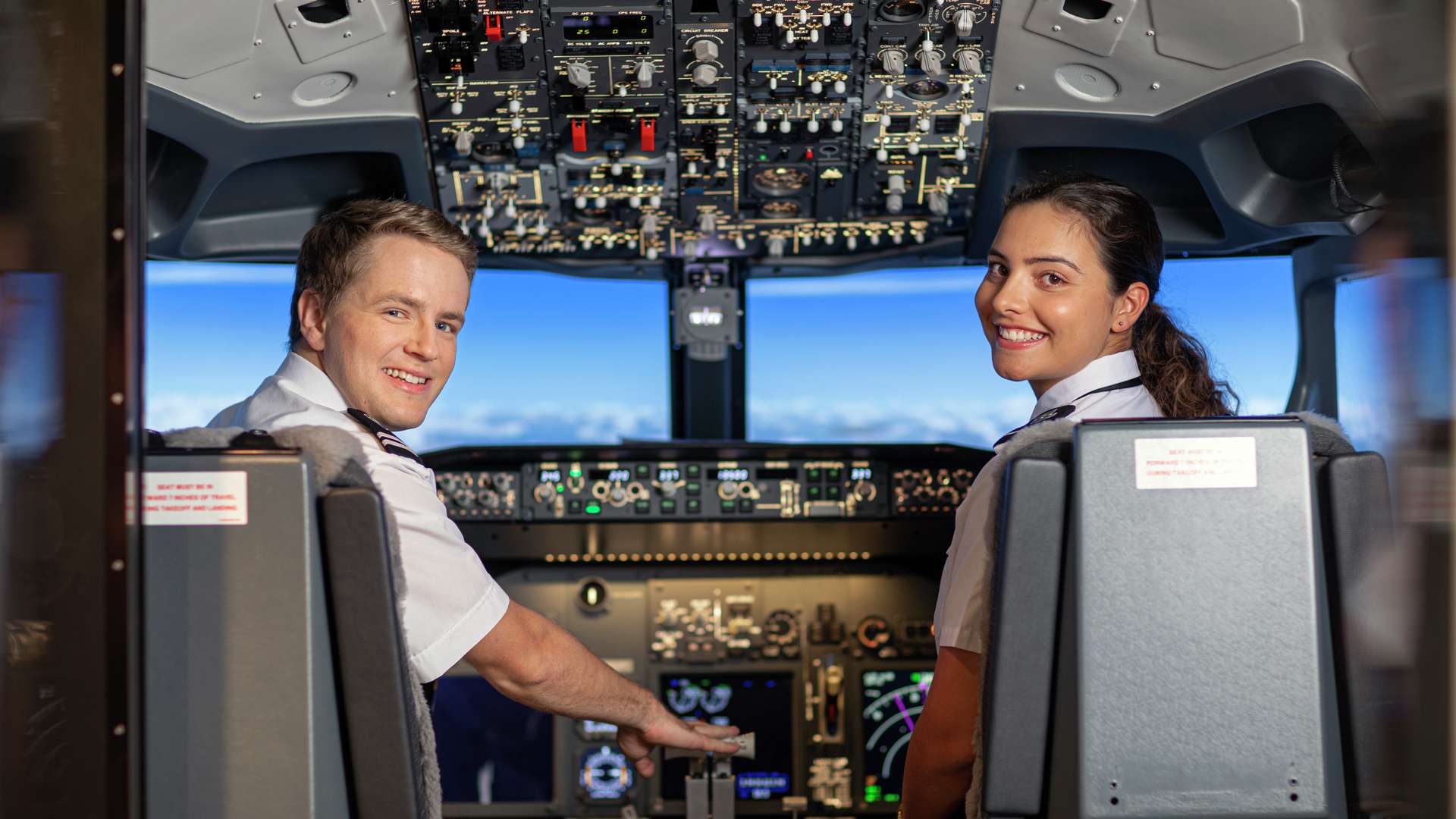
If your career aspiration is to become a professional commercial airline pilot capable of managing a multi-crew environment, then the Bachelor of Aviation (Commercial Pilot) will prepare you for this. The degree will provide you with the knowledge, skills and experience to satisfy the requirements for a Commercial Pilot Licence and Command Instrument Rating, and to become a commercial pilot.
The Bachelor of Aviation (Commercial Pilot) can be packaged with an optional Test of English for Aviation Preparation course.
The Bachelor of Aviation (Commercial Pilot) will prepare you for a career as a commercial pilot. In this course, you will gain the aeronautical knowledge and experience required to achieve a Commercial Pilot License, Multi-Engine, and Command Instrument Rating and meet the Australian educational standards for a Bachelor Degree.
In the first term of your study, you will prepare for flight training by learning about the aviation industry, the fundamentals of flight, and aviation safety. In your second term, you will begin your flight training and start Commercial Pilot License (CPL) theory coursework.
During your second year of study, you will continue fight training and CPL theory coursework, as well as undertaking more advanced theory courses in human factors and safety.
During your third year, you will complete your flight training and achieve a Commercial Pilot License and Multi Engine Command Instrument Rating. You will also undertake a capstone Aviation Project that will provide you with the opportunity to showcase your knowledge and analytical skills through the presentation of a research project on an approved aviation-related topic.
Units in this course that include flight training are delivered by a third party provider. Flight training costs are estimates and subject to change according to the provider.

The classroom is so unique, I can see the aeroplanes and the runway through my classroom window, and the simulator is one of the best I've seen! It's so realistic and I can apply the knowledge to a real-life situation.
Minh Triet Le
Bachelor of Aviation (Commercial Pilot) | Vietnam
Learning to fly at an international airport like Cairns has been a game-changer. Communicating with ATC and navigating real weather conditions is shaping me into a confident pilot.
Mahima Chaudhary Kalwar
Bachelor of Aviation (Commercial Pilot) | Nepal
When you graduate with the Bachelor of Aviation (Commercial Pilot) you will meet the aeronautical knowledge and experience requirements for careers as a commercial pilot in the air transportation industry. You would normally be legally qualified to work as a commercial pilot and have access to aviation careers in the air transportation industry, or a cadetship/ traineeship offered by some airlines. With additional flight training, you can explore opportunities in general aviation such as; flight instructing, tourism operations and agricultural operations such as mustering and crop spraying.
The course structure and available locations can change depending on when you want to study. You can choose the intake that best suits you in the drop-down menu below.
You must complete 19 units (144 credits):
The units you'll study are listed below. Click on a unit to learn more.
In the third year, AVAT13013 includes flight training in a CASA-approved simulator. AVAT13013 provides the students with the “Certificate of Completion -Multi-Crew Cooperation” for successful completion of all training requirements prescribed in the Aviation Australia Multi Crew Cooperation (MCC) course pursuant to Part 61 and Part 142 of the Civil Aviation Safety Regulations 1988 (CASR).
The course includes flight training of up to 227.3 hours total time (207.3 hours flight time and 20 hours simulator time), 100 hours of pilot in command time and 46 hours of instrument time.
This should be sufficient to obtain your Australian Commercial Pilot Licence (CPL) and a Multi Engine Command Instrument Rating (MECIR).
If you require extra flight hours to reach the required standard for each unit, there will be additional costs, see the Handbook under 'More Details'.
If you have already completed a study relevant to the course you have enrolled in, you may be eligible for credit transfer.
For your application to be considered, you must meet the following entry requirements.
While not needed to apply, you'll need to meet the following requirements throughout your studies.
This is an approximate cost of enrolling in this course, shown in Australian dollars (A$), for one academic year and is based on a full-time study load (8 units over 2 terms).
The estimated course fee quoted does not include the flight training fee. The flight training costs are determined by the flight training provider, and these costs may be subject to change.
Any additional hours of flight training that you may need to undertake or repeat will be an additional cost – an indicative cost of A$600 per hour for single-engine aircraft, and A$870 per hour for a twin-engine aircraft.
Fees are reviewed each year and are subject to change.
Scholarships are not available for this course.
In addition to your course fees, you must have sufficient funds to cover other study and living expenses. These may include visa application fees, Overseas Student Health Cover (OSHC), textbooks and learning materials, checks and certifications, living expenses and more.
Our easy to use online application system for international students will guide you through the process of applying for a course at CQUniversity Australia.
CQUniversity Australia is a trading name of Central Queensland University
ABN: 39 181 103 288
RTO Code: 40939
CRICOS: 00219C
TEQSA: PRV12073